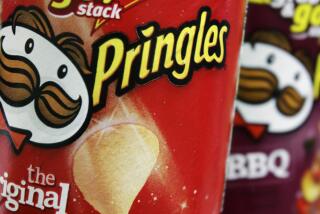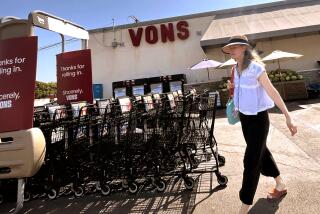Candy maker Mars is buying L.A. animal hospital chain VCA for $7.7 billion
- Share via
VCA Inc. has spent the last three decades consolidating chunks of the pet health industry into a leading chain of animal hospitals and diagnostic labs.
Now the Los Angeles company has agreed to be bought for $7.7 billion by Mars Inc., which is best known for its candy but also owns a significant pet-care business.
VCA operates nearly 800 animal hospitals and 60 diagnostic laboratories in the United States and Canada.
The firm employs 23,000 people — including about 1,400 in the Los Angeles area — and had 2015 revenue of $2.1 billion.
VCA’s founders, in a letter to employees, said they had “mixed emotions” when approached by Mars but ultimately decided the offer was best for shareholders and employees.
Mars, which is based in McLean, Va., and has $35 billion in annual sales, is the privately held maker of brands such as M&M’s, Snickers, Milky Way, Skittles, Dove chocolate and Wrigley’s gum.
The century-old company also has a major pet-care unit whose pet food brands include Pedigree, Whiskas and Sheba. It owns Banfield Pet Hospitals, many of which are in PetSmart Inc. retail locations.
In the employee letter, VCA management said the company would keep its headquarters in Los Angeles and continue to operate under the VCA name as part of Mars.
Originally called Veterinary Centers of America Inc., VCA was started in 1986 by founders who included brothers Robert and Arthur Antin.
Robert Antin is VCA’s chief executive and Arthur Antin is its chief operating officer. VCA said they and other members of its senior management would stay with the company after the Mars acquisition.
VCA said that its employees’ “tenure and seniority with VCA ... will be maintained” and that the Mars deal would offer them “enhanced career-development opportunities.” The companies didn’t indicate whether any job cuts may occur after the deal closes.
VCA has used acquisitions to combine hospitals, diagnostic labs and veterinarians into its network. In 2014, the company even acquired a dog day-care chain called Camp Bow Wow.
The purchases have enabled VCA to broaden its geographic reach — California is the chain’s largest market — and its scope of services over the years, even though it was hit hard by the last recession as cash-strapped consumers cut back on spending for pet-care services.
More recently, VCA and others in the industry have capitalized on a growing willingness among pet owners to spend more heavily for their animals.
VCA’s flagship hospital in West Los Angeles offers 24-hour emergency care, a team of surgeons, a cancer center, surgical suites and a physical therapy center.
VCA has been criticized at times by some customers for requiring tests that can be costly, but VCA maintains that it’s against its policy to sell unnecessary tests or treatments. Other customers have said they appreciate the advanced options VCA offers.
The company routinely contacts veterinary clinics and others in the industry to see if they’re interested in selling their business to VCA, which at times has alarmed some veterinarians who see VCA’s efforts as threatening the future of independent veterinary practices and hospital owners.
VCA executives have said the overtures are meant to discover owners who are amenable to selling and are in no way hostile.
Brian Tanquilut, an analyst with the investment firm Jefferies, said the field remains crowded regardless of VCA’s growth.
The industry still is “highly fragmented” and it’s unlikely there will be antitrust objections to the Mars-VCA deal because “the combined entity would own roughly 6.5% of the North American market (26,000 animal hospitals) in terms of locations,” Tanquilut said in a note to clients Monday.
The proposed merger calls for Mars to pay $93 for each of VCA’s shares and to assume VCA’s $1.4 billion in debt. After the deal was announced, VCA’s stock — whose ticker symbol is WOOF — soared $20.02, or 28%, to $90.79 a share.
“VCA is a leader across pet healthcare and the opportunity we see together — for pets, pet owners, veterinarians and other pet care providers — is tremendous,” Mars Chief Executive Grant Reid said in a statement.
The deal was approved by both companies’ directors, but remains subject to approval by VCA’s stockholders. It is expected to be completed in this year’s third quarter.
“We simply believe Mars ... found VCA to be an attractive long-term asset, and we would expect the two businesses to complement one another quite nicely,” analyst Nicholas Jansen of the investment firm Raymond James & Associates said in a report Monday.
VCA’s revenue grew to $2.1 billion in 2015 from $1.5 billion in 2011, and its profit over that span climbed to $216.1 million from $100 million.
In turn, VCA’s stock price soared from about $20 a share in early 2012 to nearly $71 a share Friday before the proposed purchase by Mars was announced.
Twitter: @PeltzLATimes
ALSO:
Downtown L.A. hasn’t seen this much construction since the 1920s
Azubu wasn’t funded like most start-ups — which may have nearly killed it
Theme park crime: Counterfeiters prefer Disneyland; shoplifters like Universal Studios Hollywood
UPDATES:
4:30 p.m.: This article was updated with additional information about VCA’s history.
2:30 p.m.: This article was updated with VCA’s closing stock price and an analyst’s comment on potential antitrust issues.
12:40 p.m.: This article was updated with details about VCA’s history, executives and range of services.
10 a.m.: This article was updated throughout with Los Angeles Times staff reporting, including more details about each company and its products, as well as an analyst’s comment.
This article was originally published at 8:35 a.m.
More to Read
Inside the business of entertainment
The Wide Shot brings you news, analysis and insights on everything from streaming wars to production — and what it all means for the future.
You may occasionally receive promotional content from the Los Angeles Times.











